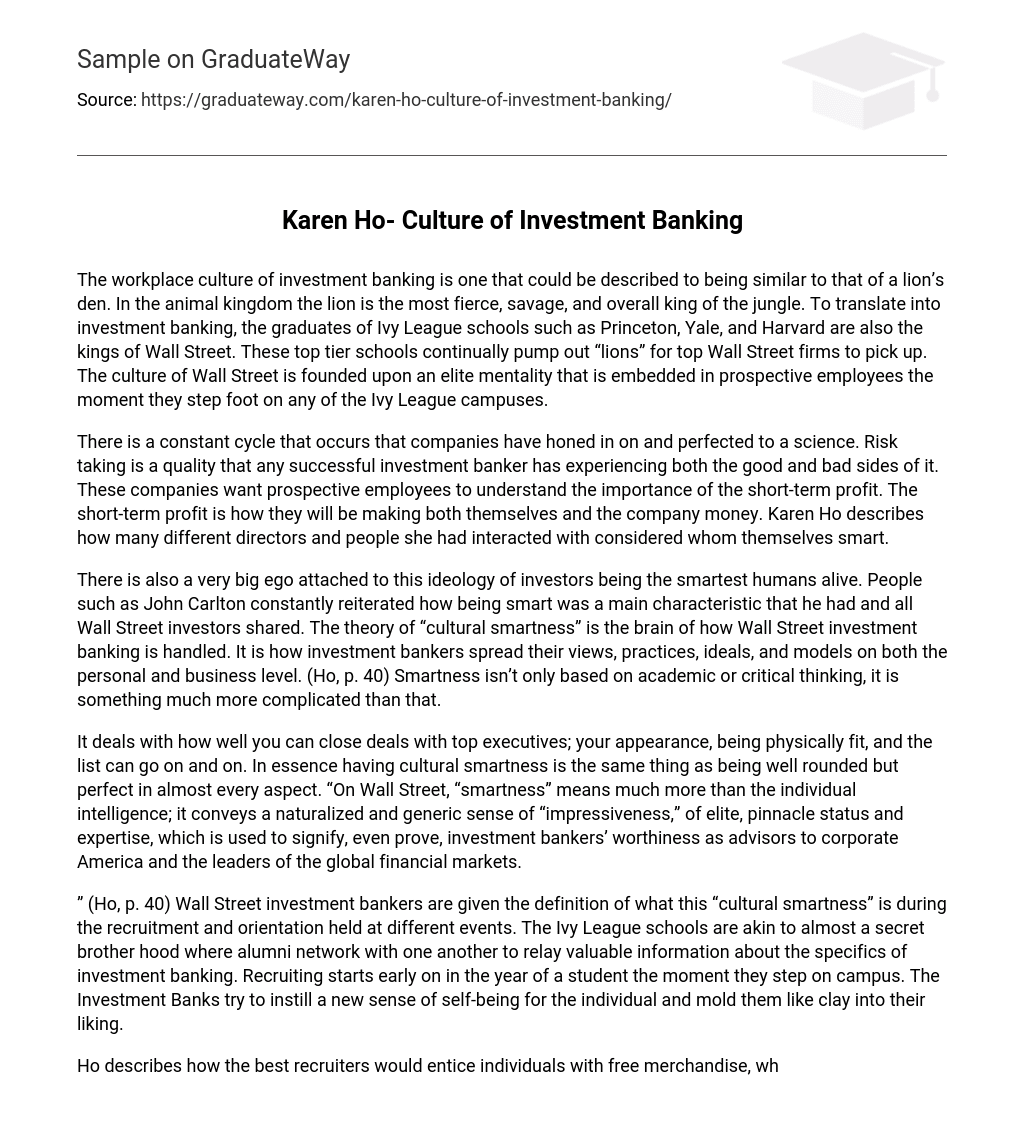The workplace culture of investment banking is one that could be described to being similar to that of a lion’s den. In the animal kingdom the lion is the most fierce, savage, and overall king of the jungle. To translate into investment banking, the graduates of Ivy League schools such as Princeton, Yale, and Harvard are also the kings of Wall Street. These top tier schools continually pump out “lions” for top Wall Street firms to pick up. The culture of Wall Street is founded upon an elite mentality that is embedded in prospective employees the moment they step foot on any of the Ivy League campuses.
There is a constant cycle that occurs that companies have honed in on and perfected to a science. Risk taking is a quality that any successful investment banker has experiencing both the good and bad sides of it. These companies want prospective employees to understand the importance of the short-term profit. The short-term profit is how they will be making both themselves and the company money. Karen Ho describes how many different directors and people she had interacted with considered whom themselves smart.
There is also a very big ego attached to this ideology of investors being the smartest humans alive. People such as John Carlton constantly reiterated how being smart was a main characteristic that he had and all Wall Street investors shared. The theory of “cultural smartness” is the brain of how Wall Street investment banking is handled. It is how investment bankers spread their views, practices, ideals, and models on both the personal and business level. (Ho, p. 40) Smartness isn’t only based on academic or critical thinking, it is something much more complicated than that.
It deals with how well you can close deals with top executives; your appearance, being physically fit, and the list can go on and on. In essence having cultural smartness is the same thing as being well rounded but perfect in almost every aspect. “On Wall Street, “smartness” means much more than the individual intelligence; it conveys a naturalized and generic sense of “impressiveness,” of elite, pinnacle status and expertise, which is used to signify, even prove, investment bankers’ worthiness as advisors to corporate America and the leaders of the global financial markets.
” (Ho, p. 40) Wall Street investment bankers are given the definition of what this “cultural smartness” is during the recruitment and orientation held at different events. The Ivy League schools are akin to almost a secret brother hood where alumni network with one another to relay valuable information about the specifics of investment banking. Recruiting starts early on in the year of a student the moment they step on campus. The Investment Banks try to instill a new sense of self-being for the individual and mold them like clay into their liking.
Ho describes how the best recruiters would entice individuals with free merchandise, which not only creates a stronger tie to the individual but it also markets, the brand for free every time the student displays the item. Globalization and investment banking go hand in hand with one another. In fact all of the cultural ideals of investment bank (smartness, elitism, downsizing etc. ) correlate and flow with each other. They all share the same quality of a “winner” or “be the best” mentality. Globalization essentially is the international integration of products, ideas, and values.
Investment bankers have a love for one thing in life, which would be money. Globalization is a way to increase their profits for the bank but can also be a risky move. “The very practices (such as global ambition and marketing, and the relentless pursuit of deals) that help to generate and spread Wall Street dominance also create the conditions for its instability, even demise. (Ho, p. 297) Globalization can result in economic crises when combined with downsizing a company when it is trying to save money.
For example if multiple banks in the USA place all of it’s funding internationally into a corporation in Cambodia that fails then the entire economy of the United States is affected. An economic crisis can be achieved when all parties involved get too risky and careless with decision making. Investment bankers that borrow too much money and cant turn a profit on loans hurt both themselves and the bank. When people can’t afford to pay off their mortgages and homes and businesses go up for sale the snowball effect starts to take place and affects the consumer, investor and banks.
In closing I think that the culture of Wall Street needs to take a major change. As Karen Ho describes in her ethnography the business is full of risks that affect the country on a macro level. For instance many prospective employees that attend prestigious public schools such as Stanford or Berkley will not even be considered do to the tight community of Ivy League alumni. A solution to this problem of avoiding an economic crisis could be to limit the amount of funding investment bankers are allowed to withdrawal. They are basically gambling with money that they never physically see and that can lead to devastating consequences.





